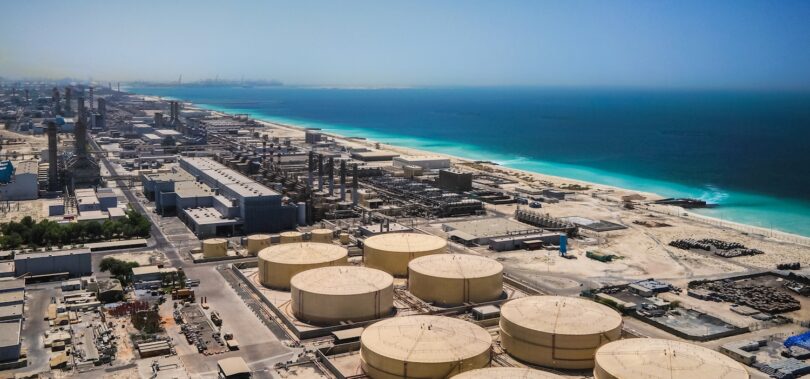Set against a changing climate, prolonged droughts, and overextraction, political disputes over access to water resources are shaping international relations. Clean water is crucial for society, economies, and food production so, when countries face water shortages, tensions rise and governments start to accuse each other of taking more than their fair share from shared rivers, lakes, and aquifers.
However, although dwindling water resources are a huge problem, especially in areas with high population growth, political instability is not the inevitable outcome. Desalination, already used extensively in MENA and other parts of the world, offers an alternative source that can defuse conflicts and provide agriculture, industry, and people with the water they need.
To learn more about how desalination can help prevent conflicts, we talked to Shannon McCarthy, the Secretary General/Executive Director of the International Desalination and Reuse Association. With a deep knowledge of the subject and direct experience of how it can reduce friction, she explains how desalination can help solve the global water shortage and discusses ongoing improvements to the technology. Most importantly, Shannon reveals how desalination can promote cooperation and become a catalyst for peace.
Can you share your background and passion for desalination? What led you to pursue it as a career?
My academic background in international relations and public policy laid the foundation for my belief that technical solutions to support increased amounts of clean water—such as through desalination—can build resilience, strengthen security, improve quality of life, and even bridge divides between communities.
It was through my work at the Middle East Desalination Research Center in Oman, a special project born from the Middle East Peace Process, that I first entered the field of desalination. Serving as Deputy Center Director, I witnessed how bringing experts from across borders together around a shared water challenge could ease tensions and build trust. That experience shaped my conviction that desalination is not just about technology; it can also be a tool for peace.
For over two decades, I have dedicated my career to advancing non-conventional water resources as solutions to scarcity, working across the Middle East and North Africa, including the Gulf Cooperation Council, Jordan, Israel, and the Palestinian Authority. Repeatedly, I have seen how water scarcity can stall social and economic development and even fuel conflict—while investments in desalination and other non-conventional water solutions can open the door to opportunity, cooperation, and hope.
What is IDRA, and what role does it play in promoting desalination?
The International Desalination and Reuse Association is a global nonprofit organization founded in 1973 and now operates with members in over 60 countries. IDRA holds consultative status at the United Nations ECOSOC, FAO (via WASAG), and UNFCCC. We bring together policymakers, utilities, researchers, private sector experts, financiers, and civil society. Our work includes convening international technical conferences and forums, offering scholarships, facilitating public-private partnerships, influencing policy frameworks, and championing education and capacity building. We are a global convener and knowledge hub advancing sustainable desalination and water reuse solutions.
Why is desalination critical to solving global water challenges? What are its main benefits?
Desalination transforms seawater and brackish water into a dependable supply of freshwater, providing security in regions where conventional sources are scarce or over-stressed. Its greatest benefit is reliability—unaffected by rainfall or climate variability—making it vital for cities, agriculture, industry, energy production, and tourism.
Technological innovation has dramatically lowered costs and energy demands, and when paired with renewable power and water reuse, desalination becomes a cornerstone of sustainable, circular water systems. It not only diversifies water portfolios but also reduces stress on rivers and aquifers, while helping communities adapt to the increasing challenges of climate change.
What are the hidden challenges of desalination? How is IDRA promoting environmental and social sustainability?
Desalination delivers tremendous benefits, but it also brings challenges that must be addressed with care. Critics often point to its energy footprint, potential brine impacts on marine ecosystems, and the risk that high costs or limited local capacity may exclude rural or underserved communities.
At IDRA, our global membership actively tackles these issues through integrated, sustainable solutions. We champion pairing desalination with renewable energy and water reuse, while advancing brine valorization—such as mineral recovery, metals extraction, and zero liquid discharge. Our working groups and task forces develop guidelines for energy efficiency and environmental responsibility, and we collaborate with utilities and regulators to embed social impact assessments, circular design principles, and local procurement into project development.
This collective effort ensures desalination evolves not only as a technical solution but as a socially inclusive and environmentally responsible cornerstone of water resilience.
What emerging technologies will shape the future of desalination?
The coming decade promises transformative advances in desalination. Low-pressure membrane techniques, forward osmosis, and graphene-enhanced filters are maturing rapidly, delivering higher efficiency and lower energy requirements. Sub-sea and zero liquid discharge systems are becoming commercially viable, addressing environmental concerns around brine disposal.
Digital technologies—including artificial intelligence, machine learning, and digital twins—are enabling smarter plant operations, predictive maintenance, real-time optimization, and reduced operational costs. Brine valorization is unlocking new opportunities, allowing the recovery of critical materials such as lithium, magnesium, and gypsum. Hybrid systems that integrate solar power, desalination, and water reuse are enabling modular, decentralized solutions, ideal for remote communities or rapidly growing urban centers.
Together, these innovations position desalination as a cornerstone of resilient, sustainable water systems and a growing global market projected to reach multi-billion-dollar scale, responding to increasing demand and climate pressures.
What policies have impressed you the most? What further policies should governments and international bodies adopt?
Singapore’s Water Master Plan stands as a global benchmark, integrating desalination, reclaimed water, catchment management, and clear regulatory frameworks into a cohesive strategy. The European Union’s emerging circular water economy regulations and reuse standards set important precedents for sustainable urban water management. In the United States, the EPA has recently finalized the first-ever National Primary Drinking Water Regulation for PFAS, establishing enforceable Maximum Contaminant Levels. Additionally, California has implemented a comprehensive Direct Potable Reuse (DPR) regulatory framework, allowing treated wastewater to safely re-enter the drinking water supply, setting a precedent for scalable urban water recycling.
In the Middle East and North Africa, Saudi Arabia’s National Water Strategy emphasizes large-scale desalination paired with renewable energy and water reuse to ensure municipal, industrial, and agricultural security. The United Arab Emirates has advanced integrated water resource management combining desalination, reuse, and smart infrastructure. In Jordan, the Amman Conveyance Project demonstrates innovative approaches to secure urban water and relieve stress on freshwater sources. Morocco, Tunisia, and Algeria are scaling renewable-powered desalination and reuse projects to meet urban and agricultural water needs and enhance climate resilience. In Brazil, inland renewable-powered desalination initiatives are being implemented to combat desertification in semi-arid regions, providing reliable water for local communities and agriculture while restoring degraded lands. South Africa has integrated desalination and water recycling to address persistent water scarcity in urban and rural areas. In Australia, large-scale desalination plants in Perth and Sydney, combined with water recycling and stormwater harvesting, provide resilient urban water supplies while reducing pressure on traditional freshwater sources.
The World Bank is actively supporting countries worldwide to scale desalination and water reuse solutions, providing technical assistance, funding, and policy guidance to accelerate sustainable water infrastructure development, particularly in water-stressed regions. These initiatives emphasize circular water management, integration with renewable energy, and inclusive governance to strengthen resilience against climate variability.
These measures reflect a broader focus on responsible water stewardship behaviors, including efficient water use, monitoring and reporting, pollution prevention, and public engagement in water sustainability. Despite these successes, there is a pressing need for more cross-border governance, especially for shared seas, transboundary aquifers, and international river basins. Effective policies should promote data sharing, joint R&D investment, environmental safeguards, transparent tariff structures, social inclusivity, and regulated pilot testing of emerging technologies. Governments and international bodies should also incentivize public-private partnerships and encourage water stewardship behaviors across industries and communities.
You focus on public private academic collaboration. Why is that important? Do you have a strong example?
Collaboration across sectors is essential to scaling water solutions, building workforce capacity, and ensuring that innovations are relevant to local needs. IDRA’s Fellowship, scholarship, academy, and Young Leaders Program have supported emerging water professionals from across the globe through mentoring, internships, and leadership development. These programs have partnered with leading utilities, research institutes, and agencies such as SWCC, PUB, the U.S. Bureau of Reclamation, and Water Corporation Australia to provide hands-on training and global exposure. Through its participation in with the United Nations ECOSOC, and UNFCCC, IDRA contributes to international efforts to strengthen education, training, and capacity-building in desalination and water reuse.
A recurring theme in your work is peace. How can desalination help in conflict prevention?
Water scarcity has often caused tension, especially when shared across regions or states. However, desalination and reuse provide a reliable and independent water source, reducing pressure on shared freshwater resources and helping prevent disputes. Supplementing water supply allows communities and countries to manage scarce resources collaboratively rather than competitively.
By integrating desalination with renewable energy and water reuse, countries can enhance water security, reduce conflict risk, and promote sustainable cooperation, transforming water from a potential source of tension into a pathway for peace and stability.






